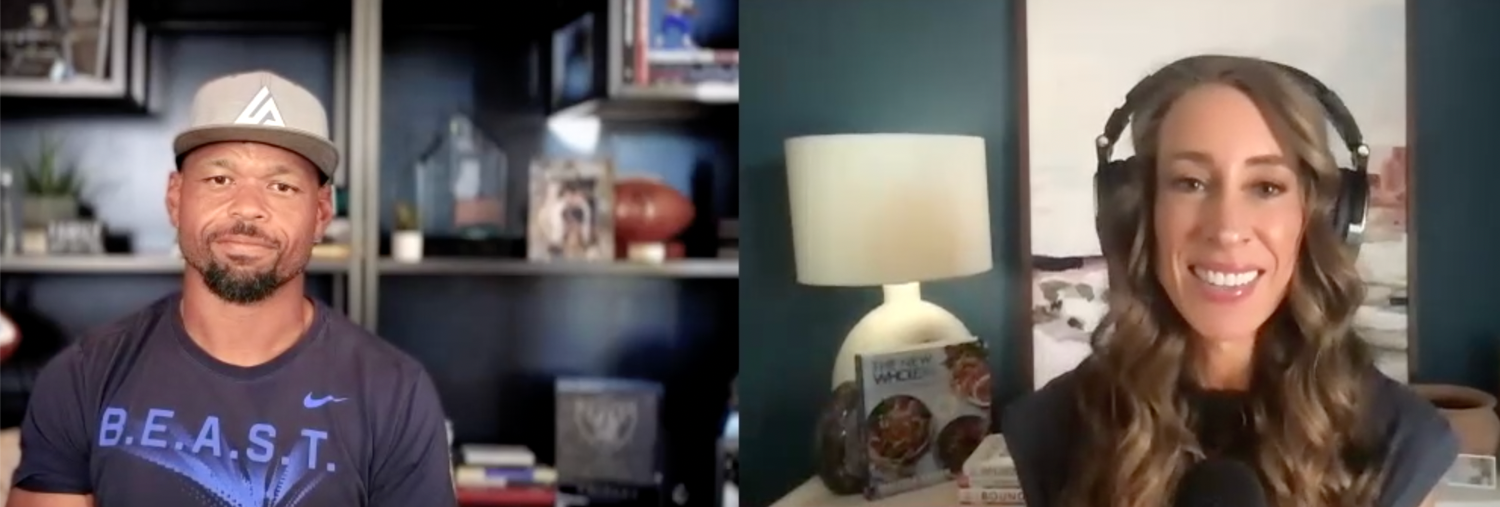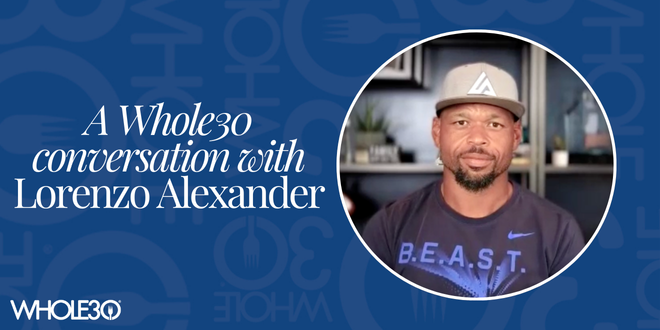Lorenzo Alexander is accustomed to the bright lights. In his decorated NFL career, he played 191 games, racking up two Pro Bowl appearances, and one All-Pro nod. So he’s no stranger to the spotlight—or Whole30.
After his most recent round of the program, Lorenzo once again stepped into the limelight for an enlightening, inspirational, and wide-ranging conversation with Whole30 CEO Melissa Urban.
The interview below has been edited for length, but you can see the full video version on YouTube right now. Don’t miss a second of Lorenzo’s Whole30 journey, the benefits he experienced, what the program taught him, and so much more.
Melissa Urban: I’m here with Lorenzo Alexander, who is going to talk about his Whole30 experiences. Lorenzo, it’s wonderful to meet you. Why don’t you introduce yourself?
Lorenzo Alexander: I’m a 15-year NFL vet. I’ve had the privilege to play for five different organizations. I grew up in the Bay Area, and went to University of California Berkeley. I have a wife of 17 years. We have four children, and currently reside in the Phoenix area.
My health journey has been really unique—even in the experience of football. So when I was in high school, even in the NFL, at my biggest, I was at 315. And by the end of it, I was at 235. So I’ve had a very unique career from the standpoint of having to do this transformation. And I think during that transformation, I got introduced to Whole30. It’s been a real cool experience to learn about my body, my health, and really, at the end of the day, having the right perspective. It’s been a real key in my life, and it continues to be as I retired from the NFL.
“After you get through that first week or so I really just enjoyed the entire process.”
MU: I’m excited to talk to you. We don’t have a lot of professional athletes. We’ve had Justin Turner, a baseball player, do the Whole30, but I’ve been excited to talk to you as an NFL player. Tell me about your first Whole30.
Lorenzo: When we first heard about it, I was in Buffalo. It was actually towards the end of my career. My wife’s friend, Jill, who was one of my teammates’ wives, had been doing it and she told my wife about it. I said, “Yeah, cool. I’ll do it with you.” That had to be between the 2016 and 2017 season that we did it for the first time. I just loved the experience and how my body felt. It wasn’t easy when you go through and you’re taking things away from your diet that you’re used to eating. But after you get through that first week or so I really just enjoyed the entire process.
MU: So you did your first Whole30 while you were playing for the Bills?
Lorenzo: Yeah. I mean in the offseason. I didn’t do it during the season. That would have been a little bit too hard mentally, being sore and then also trying to be disciplined and locked in. But as I got older, in the offseason, I wanted to detox, kind of reset, and really start anew after every season. And I had this mindset of always staying in shape and always trying to find different things.
After a football season, when you feel bad, you tend to eat bad or you justify things. “Well, I just played the game. I can eat whatever.” And so after the end of a season, football players, really athletes in general, your body’s really beat up. So this was really a good time to get away from a lot of that processed food, get away from the sugar, and just allow my body to start healing itself and really focus on getting healthy. And that was just the real cool part about it, and that’s why I started implementing it in most of my offseasons after that.
“I know as soon as I went on the Whole30 this past time, I was less inflamed.”
MU: That’s so cool. What were the results of your first Whole30? What were you expecting from the program or hoping for? And then did you get any results that were unexpected?
Lorenzo: I think the biggest thing is I just always want to have a lean composition. So I typically eat pretty—I don’t say healthy—but with intentionality, as far as what I’m putting in my body. But you start to realize that a lot of stuff that’s made today is much different than when we grew up and when our parents grew up, right? Especially when you think about the additive of sugar. So one of the things I got out of the Whole30 is I became more aware of the labeling and what is in this and how much of it is there. Even though I think I’m eating something good, let me actually read the label and see what’s in it to be a little bit more informed.
Also I’ve always been this bigger guy in my career—and just in life. So, like I told you, I was 315. I was always the biggest kid, so one of the things that I’ve always wanted to do—and this is just my personal thing—is getting lean enough so I can see my abs. And when you start eating in a certain way where you’re taking the sugar out, you’re taking all of the calories you don’t necessarily realize that you’re drinking or eating. Then you’re able to do that—from my perspective—in an easier fashion because when you eat like that, you don’t have all these additional calories that sometimes you’re unaware of.
MU: I would imagine after a season you probably feel pretty inflamed. Did you notice Whole30 helping to reduce that inflammation, as well, which can actually lead to some visible body changes?
Lorenzo: Yeah, for sure. This last time, I think I’ve probably felt that the most. I’m over 40, and as I’ve gotten older and gotten further away from the game, I still try to work out. But, again, your body just ages and it handles things differently. And I know as soon as I went on the Whole30 this past time, I was less inflamed. My joints didn’t hurt as much after a workout. Obviously you want to work out, but 80% of how you feel and how you move and the gains that you see comes from how you eat and what you put in your body.
“Diabetes runs in our family, and being able to control that sugar intake helps immensely.”
MU: A lot of people also talk about Whole 30 improving energy and just having steadier energy throughout the day, which certainly helps with sleeping better. Have you noticed any changes in your sleep or energy?
Lorenzo: I would definitely say it’s true because you don’t have to deal with the spikes of your blood sugar. Diabetes runs in our family, and being able to control that sugar intake helps immensely. I also challenged my mom to do the Whole30 this time. She is diabetic, and she saw a significant change in her blood sugar levels checking that every day. It’s helped her out a lot. So, if you’re diabetic, it’s just great because you learn how to eat good food, healthy food, that tastes good, but then you’re also helping yourself if you have a condition like diabetes.
MU: That’s cool that you brought your mom on board. We hear that quite a bit with people who bring their parents or even grandparents on board. How did you support your mom during her first Whole30? And then what kind of support do you ask for from your family when they aren’t doing the program with you?
Lorenzo: For my mom, it was just giving her help with the meal plan. When she’s going to the grocery store, she can look up things that are Whole30 compatible, or find different options. Then I would say, from my perspective, it’s unique because I’ve always had to do things different than my family because I was a professional athlete. So they’d be eating McDonald’s or whatever and I’m like, “I’mma pass on that, and I’mma wait ‘til we get home.”
But the biggest thing when that comes with that is obviously cooking. My wife has done an excellent job of getting on board and making those type of meals, especially for the family at dinner when we’re all coming together. She’ll make stuff that’s Whole30 compatible. And the kids, a lot of times, if you don’t tell them nothing, they don’t even realize anything, and they’ll be like, “Oh, this is good.” So it’s been a good experience from that aspect, as well.
MU: That’s such a good point. I often say if you’re cooking from any of our recipes—or even if you’re just throwing whole ingredients together, cooking them, tying them together with the dressing or sauce—if you had people over for dinner and you fed this to them, they would not think that this was diet food. It’s just delicious, whole, nutrient-dense food. What are one or two of your go-to Whole30 meals?
Lorenzo: Oh man. I’m really simple. I like egg whites and then having a protein with it. Then I make my coffee. And that’s kind of my thing in the mornings. I love when my daughter was making this buffalo chicken with cauliflower rice, which was really good, as well. We started making that together. So those are probably two of the things that I like that are really simple, really easy to make and put together in a pretty short time.

“Those things happen and you give yourself grace and then you move on.”
MU: I think that’s so smart. I love the idea of keeping it simple. Just pick a protein, pick a veggie side, add some fruit once in a while, add some healthy fats, and that’s all you really need.
I’m curious, with this last Whole30 you started in June, because you’ve done so many, was it easier to jump back into it? Did you experience any of those typical hangover effects in your first week or did you sort of skip that phase because you’re so experienced?
Lorenzo: I think the only things that I typically run into is that first week where we all have our routine and our tendencies. The first day I went over to this golf place. I normally grab these mints that have sugar, and I just popped it in before you’re like “Oh, I can’t have this.”
So those things happen and you give yourself grace and then you move on. I don’t let a meal or me making a mistake mean I’m done with the whole thing. You just start from wherever you’re at and just continue to move forward. Like when you have to travel sometimes and you forget, you don’t plan properly, and it may not be 100% but you just try to find the best possible thing. And you keep it moving and be ready for the next time. Once you get into the groove and you get to prep and plan, then you’re much better off.
MU: I often tell people your only job on the Whole30 is to put Whole30 food in your mouth. That’s it. It doesn’t have to be the perfect balanced meal.
“We’ve normalized feeling a certain type of way and being inflamed, like this is what it’s going to be. It doesn’t have to be that way.”
MU: I’m curious, as someone who spent many years as a professional athlete—15 years in the NFL—and now someone who continues to work out and take care of your body and you’re very active. Did you have to adapt your Whole30 meal planning to fuel your activities?
Lorenzo: It really all comes down to your goals and what you’re trying to do, right? I just had to go up in protein. I would say, as you’re going through this, you have to figure out what works for your body. Obviously, I’ve been in a space where I’ve had to be very in tune with my body over the course of the years of being a professional athlete. So I found what has worked for me. I would say figure out what your goals are, get with your trainer, and then go from there. If you partner those two things [whole foods and the right amount of caloric intake] together, you’re going to see great results as far as your health journey, how you feel, how you get around, and just your quality of life as you continue to move forward.
I think sometimes people don’t realize how bad you feel, right? We’ve normalized feeling a certain type of way and being inflamed, like this is what it’s going to be. It doesn’t have to be that way. And I think when you add the food into the working out, you’ll actually see how much better you’ll feel. That’s what you fall in love with. Just like my mom. She’s like, “Man, I just fell in love with how I feel, especially with my blood sugar.” And she’s actually like, “I’m not even working out a lot, but I just feel better.” I think that’s what the goal is, right? I want to have a high quality of life and be feeling good so I can be there for the people around me in my life at the highest level every time I see them.
MU: Absolutely. I talk about Whole30 almost unlocking this new level of normal. You’re walking around, you’re tired all the time. Maybe you’re not sleeping as well, or your joints are a little achy. Maybe your digestion is off. But you don’t realize it because that’s just your baseline. That’s just your normal. And then you do a Whole30 and you realize this is as good as I can feel. I can walk around now feeling like this.
Lorenzo: Yeah. And that’s what people fall in love with. Then you start adopting the Whole30. You may not do it all the time, but that’s going to be the majority of how you eat. That’s what I do now Monday through Friday. On the weekends, we may go out on a date night or the kids are doing something and so we may go off of it a little bit, but the majority of the time, I’m trying to stay within that fence. And there’s a lot of freedom in that fence. I think people have issues with boundaries, but within those boundaries, you have a lot of freedom. And those boundaries are set up to protect you from the things that we’re talking about—of this being normalized, being in pain, that food can create for you if you’re eating the wrong thing.
That’s the way I like to think about it. You get a lot of freedom, and on the back end, you get the benefit from it. You’re around longer with a better quality of life. Like I said, I have a 15-year-old. I’m 42. I can still get out there and run around with him. And I want to be able to do that when I’m 50, 60, having grandbabies. I still want to have an active life. So I want to be proactive in making sure that I can maximize whatever that looks like for me at those ages.
MU: When you do the Whole30, you figure out the foods that do and do not work well in your unique system. And some of the stuff that might be healthy for one person doesn’t feel great in your body and vice versa. Once you know that, then you’re like, I can eat anything I want—if I’m willing to accept the consequences. I know how this food is going to impact me and I’m going to enjoy it. And if I don’t want those consequences, I have all of these foods over here that I can put into a meal plan and I’ll be satisfied and they’re delicious and it’s going to keep me feeling my best. I think that’s a lot of the freedom of the Whole30, right?
“Whole30 has done a lot of cool things for me on different levels. But for our men out there, it’s definitely something worth doing, understanding who you are…”
MU: We’ve talked a lot about the physical benefits of the Whole30 program, but I’m curious—did any of your Whole30 experiences help you address or think about your emotional relationship with food?
Lorenzo: This was probably more so when I played, but when I felt bad, I ate bad. Like, “Man, I just want a big pizza right now.” So that aspect of it allowed me to kind of understand, and at least be aware of it. But this time I was also just more aware of some things I naturally do that I didn’t need to do. Like, for example, Starbucks—and just being bored so I’m going to go get a coffee and put creamer in it. It was just more of that type of stuff. This gave me an opportunity to kind of sit back like, “Okay, I really don’t need that even though I want that.”
MU: What you just talked about really is that intentionality and making that connection: “When I don’t feel good physically, when I’m banged up or I’m tired, I reach for pizza or I reach for sugar or I reach for like comfort foods. When I’m bored, my first instinct is, can I eat something?” I think those are really important associations that very often, you’re right, people don’t make. They’re living it and maybe even on autopilot. They don’t have a professional athletic career or a coach or years of discipline to pull them out of it.
And I think even that association, especially for men, who tend not to talk about their emotional relationship with food or their cravings, can be really powerful. Once you see it, you can’t really unsee it. And then, when that behavior pops up again, hopefully it prompts you to say, “Wait a minute. I recognize this pattern. I don’t feel good. I’m craving pizza. Here are the other three things I could do instead that will actually make me feel better.”
Lorenzo: That’s really good. And I would say men typically don’t see this as something they want to do, right? I actually encouraged a couple of my friends to do it. I did Pilates. That, for a long time, was considered a women’s thing. It’s not. We’re just trying to build intentionality, awareness of our bodies. Why wouldn’t we want to be able to do that for us as men?
So I would just challenge all the men out there just to try it—see what it’s like. Get a couple of buddies that you’re tight with—that you may already share close things with so that you can go through it together—and talk about the emotional piece. I had a couple of friends that I’ve encouraged to do it and we’re always talking, and it brings you closer too like that, too. So, Whole30 has done a lot of cool things for me on different levels. But for our men out there, it’s definitely something worth doing, understanding who you are, being more intentional, more disciplined. That’s definitely things that we want to model in our community, to our families, and really being a leader in the health perspective.
MU: I think that’s the perfect way to wrap up. I love when people say Whole30 had an impact on other areas of my life that I just didn’t expect. You do this 30-day elimination program, you think it’s going to impact physicality, your energy, your sleep. But then if you notice that it’s improving your relationships or it’s making you aware of emotional eating patterns, or bringing you closer with your kids because you’re involving them in the process, or you feel good about passing that knowledge along to your kids. I really do think the benefits can spill over into so many different areas and you just spoke to so many of them.
Thank you so much, Lorenzo Alexander. Thanks for joining me today and talking about your Whole30 experience. I’m sure you’re going to inspire a lot of people, especially athletes, to look more into the Whole30.
Receive more Whole30 content like this—as well as recipes, program resources, and articles from Melissa Urban—delivered weekly. Sign up for Whole30 emails today.















